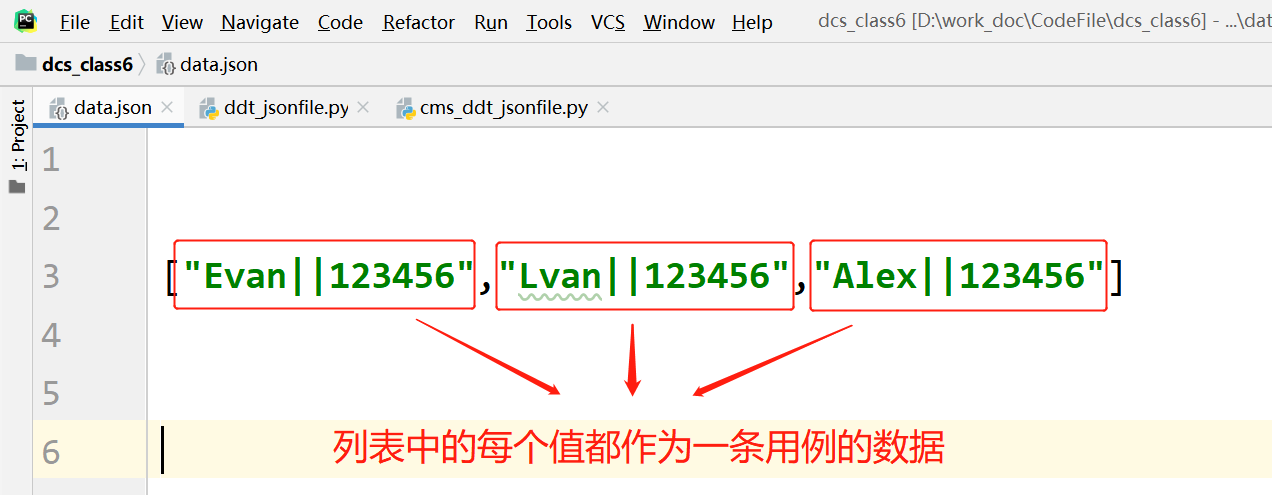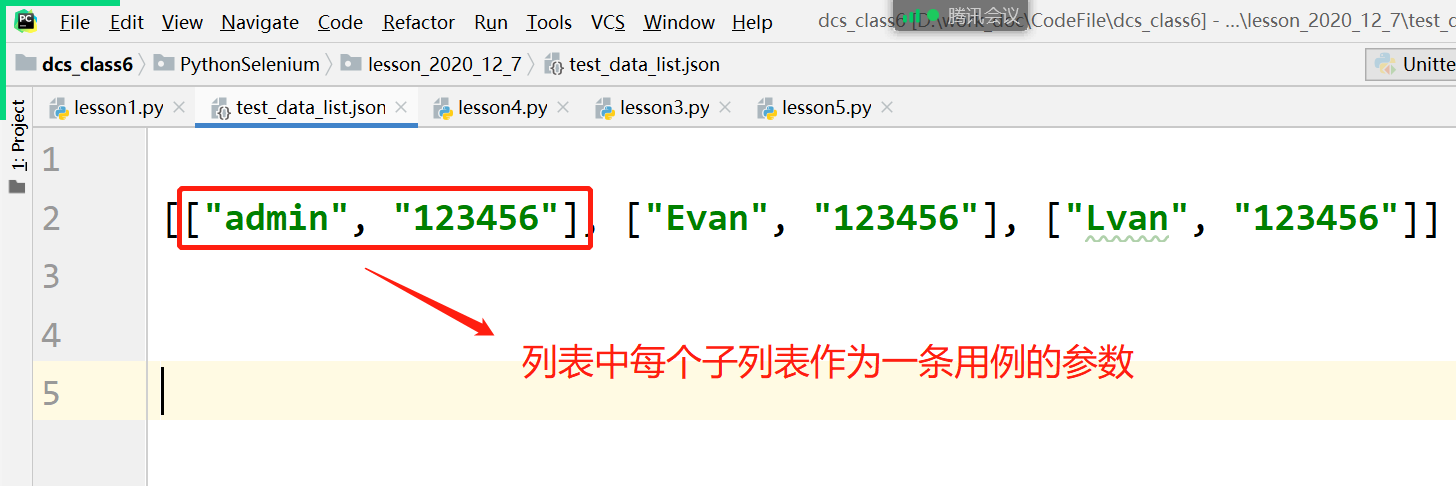一、上篇文章我们使用了 unittest + ddt 驱动 excel 文件做数据驱动测试,本篇文章我们采用 unittest + ddt 驱动 json 文件来实现数据驱动测试,话不多说上源码。。。
- ddt.file_data:装饰测试方法,参数是文件名。文件可以是 json 或者 yaml 类型。
-
注意:如果文件是以 “.yml”或者".yaml" 结尾,ddt 会作为 yaml 类型处理,其他文件都会作为 json 文件处理。
-
如果文件是列表,列表的值会作为测试用例参数,同时,会作为测试用例方法名后缀显示。
- 如果文件是字典,字典的 key 会作为测试用例方法的后缀显示,字典的 value 会作为测试用例参数。
-
- 如下图为我的数据文件,且文件中数据类型为字典

- 首先我们先熟悉下 file_data() 读取字典数据的应用
- 注意:测试用例形参要与 json 文件中的键一致
from ddt import ddt, file_data import unittest @ddt class Test(unittest.TestCase): @file_data("D:work_docCodeFiledcs_class6data.json") def test01(self, username, password): print(username, password) if __name__ == '__main__': unittest.main() # 运行结果如下 """ Ran 3 tests in 0.004s Evan 123456 Lvan 123456 Alex 123456 """
- 实例如下
import time from ddt import ddt, file_data import unittest from selenium import webdriver from selenium.webdriver.common.by import By @ddt class Test(unittest.TestCase): def setUp(self) -> None: self.dr = webdriver.Chrome() self.dr.get("http://cms.duoceshi.cn/xxx/xxxx/xxx") self.dr.maximize_window() self.dr.implicitly_wait(10) def tearDown(self) -> None: self.dr.find_element(By.ID, "loginBtn").click() time.sleep(2) self.dr.quit() def cms_login(self, username, password): self.dr.find_element(By.ID, "userAccount").send_keys(username) self.dr.find_element(By.ID, "loginPwd").send_keys(password) @file_data("D:work_docCodeFiledcs_class6data.json") def testcase(self, username, password): self.cms_login(username, password) if __name__ == '__main__': unittest.main()
- 如下图为我的数据文件,且文件中数据类型为列表一

- 首先我们先熟悉下 file_data() 读取列表数据的应用
from ddt import ddt, file_data, unpack import unittest @ddt class Test(unittest.TestCase): @file_data("D:work_docCodeFiledcs_class6data.json") def test01(self, data): testdata = data.split("||") print(testdata[0], testdata[1]) if __name__ == '__main__': unittest.main() # 运行结果如下 """ Ran 3 tests in 0.004s Evan 123456 Lvan 123456 Alex 123456 """
- 实例如下
import time from ddt import ddt, file_data import unittest from selenium import webdriver from selenium.webdriver.common.by import By @ddt class Test(unittest.TestCase): def setUp(self) -> None: self.dr = webdriver.Chrome() self.dr.get("http://cms.duoceshi.cn/xxx/xxxx/xxxxx") self.dr.maximize_window() self.dr.implicitly_wait(10) def tearDown(self) -> None: self.dr.find_element(By.ID, "loginBtn").click() time.sleep(2) self.dr.quit() def cms_login(self, username, password): self.dr.find_element(By.ID, "userAccount").send_keys(username) self.dr.find_element(By.ID, "loginPwd").send_keys(password) @file_data("D:work_docCodeFiledcs_class6data.json") def test01(self, data): testdata = data.split("||") self.cms_login(testdata[0], testdata[1]) if __name__ == '__main__': unittest.main()
- 如下图为我的数据文件,且文件中数据类型为列表二

- 首先我们先熟悉下 file_data() 读取列表数据的应用
import unittest from ddt import ddt, file_data @ddt class Test(unittest.TestCase): @file_data("test_data_list.json") def test_demo1(self, data): print(data) if __name__ == '__main__': unittest.main() # 运行结果如下 """ Ran 3 tests in 0.004s ['admin', '123456'] ['Evan', '123456'] ['Lvan', '123456'] """
- 实例如下
from selenium import webdriver from ddt import ddt, file_data import unittest from time import sleep from selenium.webdriver.common.by import By @ddt class CmsLogin(unittest.TestCase): def setUp(self) -> None: self.dr = webdriver.Chrome() self.dr.get("http://cms.duoceshi.cn/xxx/xxxx/xxxxx") self.dr.maximize_window() self.dr.implicitly_wait(10) def tearDown(self) -> None: sleep(2) self.dr.quit() def cmslogin(self, username, password): self.dr.find_element(By.ID, "userAccount").send_keys(username) self.dr.find_element(By.ID, "loginPwd").send_keys(password) self.dr.find_element(By.ID, "loginBtn").click() @file_data("test_data_list.json") def test_cms_login(self, data): username = data[0] password = data[1] self.cmslogin(username, password) if __name__ == '__main__': unittest.main()